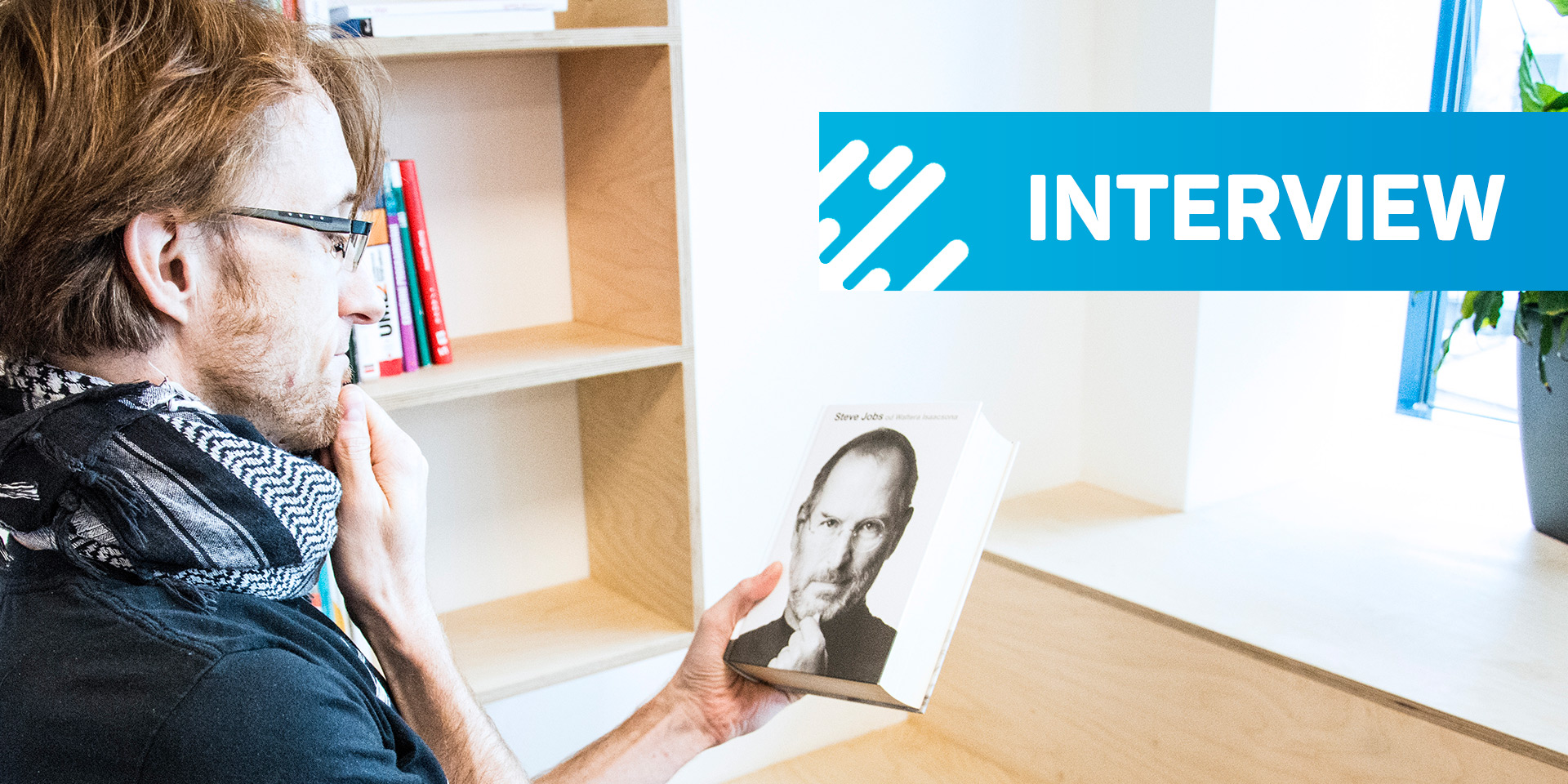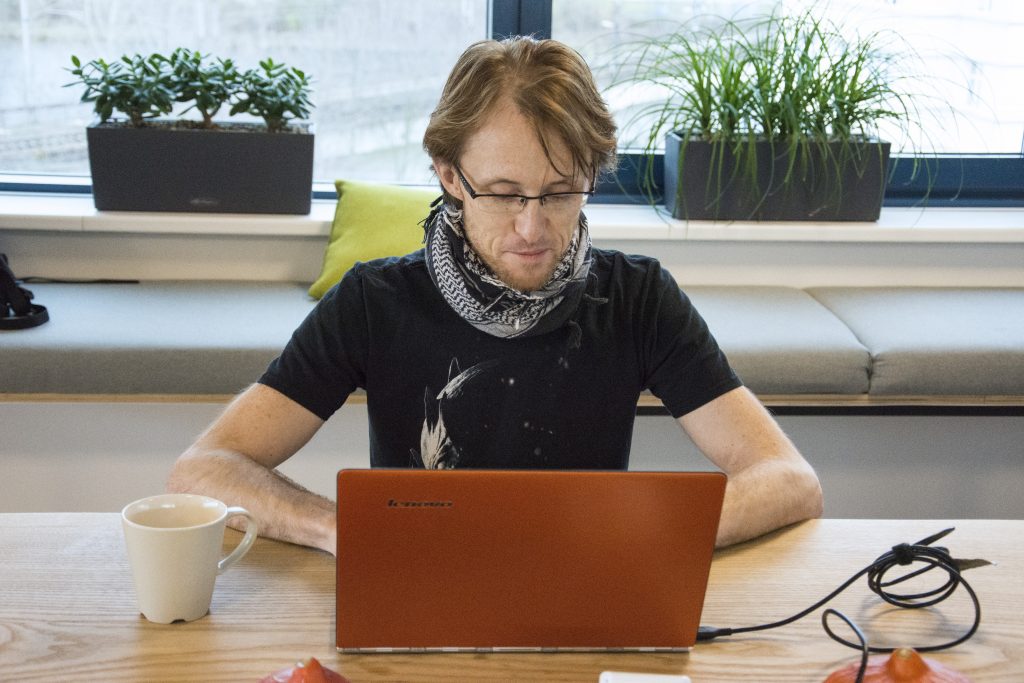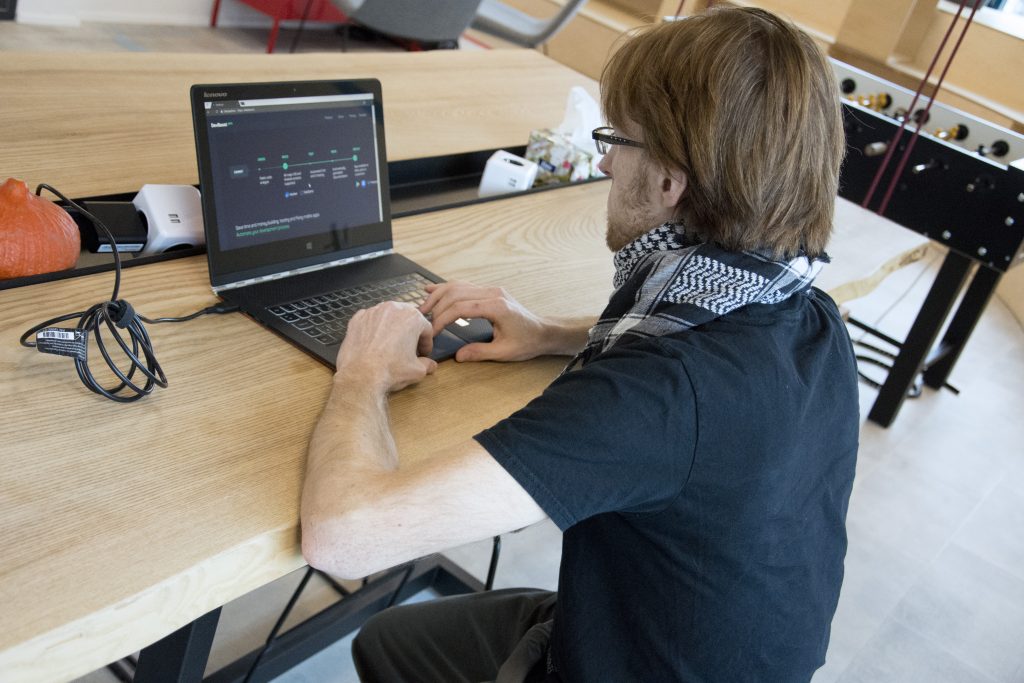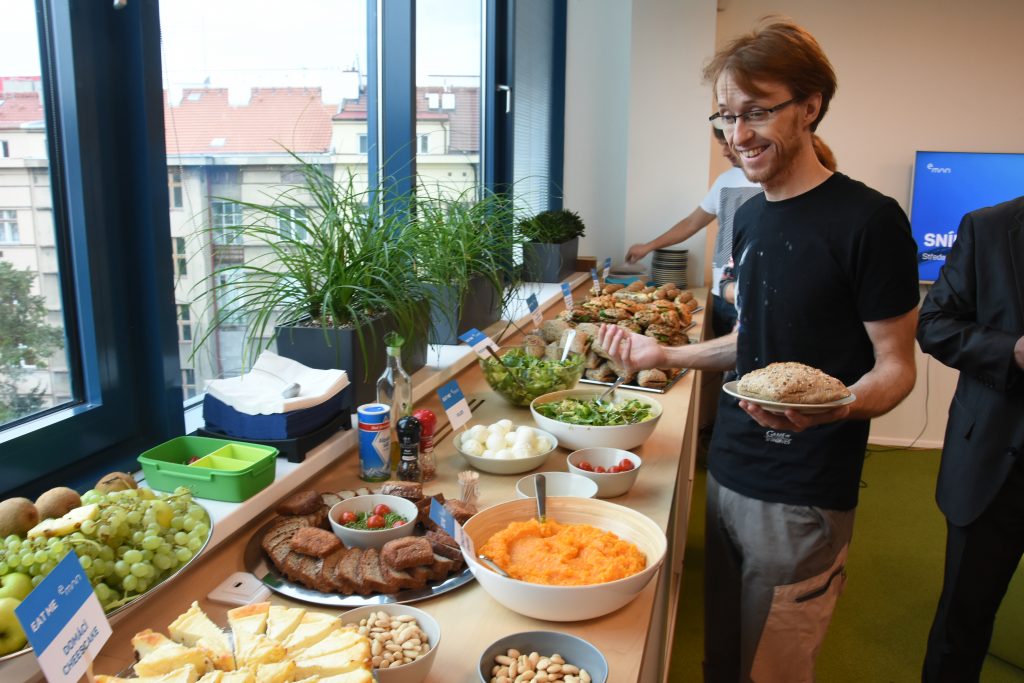Our Solution Architect shared his story with us. A journey from military service, through corporations to his own businesses and eMan. Would you believe that he taught programming to adults when he was only 14?
Jiri Pech: From 977.40 USD annual earnings to being responsible for a turnover of 220 million USD

Jiri Pech is a Solution Architect in our office in Hradec Kralove. How long have you been a part of eMan?
One and a half years.
Where did you work before?
Starting from the beginning, first I worked for VUT in Brno as part of my alternative civilian service, creating intranets and similar things. Then I worked for O2 even before it was O2. It was called Cesky Telecom and then Telefónica O2; there I created apps for telephone booths and their management. Who even remembers those, right? Additionally, I was also doing some stuff with Oracle databases and because they had around six hundred various apps linked in there, some sort of integration was always necessary.
Afterwards, I joined a company called Tech Data. Well, it was called Tech Data Distribution back then. It was the second largest distributor of IT and consumer electronics. I started as a developer and left the company seven years later as an e-commerce manager, when I was responsible for the whole yearly 220 million USD e-commerce turnover.
I founded two companies afterwards. One company was sort of an experiment – a fully automated eshop. Back then I stated that I have no clue how the electronic business can have such margins and why any people are necessary at all for running such a company when everything can be automated. So it was a proof of concept (PoC), so to say, I wrote the whole software and found out that it worked. It’s ok up until a point where a customer gets back with a complaint, so it’s somewhat viable. Unfortunately I had no time for this business so I closed it down after about three years.
The second company was co-founded by my friends, my brother, and me. It happened in the so called pre-solar era, when we all agreed that building solar power stations quite makes sense. We started building these on rooftops and we carried out the biggest project in the Czech Republic. We built a power station in Josefuv Dul with a capacity of around one megawatt on sixteen rooftops. It’s an old grounds where they had a water power plant before. They let it fall apart, stuff was stolen, then it got privatized and the new owner decided to have a source of green energy there. So we built this power station. Afterwards the solar era came and the state regulation followed, practically killing this area of business for some time. We first re-focused on heating pumps but that brought little joy to the cofounders and we decided to call it a day. We closed down the company and passed the maintenance of the power stations to companies that are quite interesting and still in business today.
I joined one software company in Hradec Kralove shortly after where my only condition for the job was that it cannot take me more than five minutes to get to work. I looked in one direction where a possible employment opportunity was but that did not pique my interest much. So I looked the other way and this software house was there, right in front of a kindergarten that my kids were attending. We also clicked with the people I did an interview with and that was it. Unfortunately, I discovered only later that this company does around 90% of their stuff in Perl, which is not a language that I would like to work in or observe others working in. That is why I started a new era in the company, when things started to be done properly and in Java. I left this company after three years for eMan, after Vladimir Gersl asked me if I would like to help start their office in Hradec Kralove. Sadly, nowadays I am more present in Prague than in Hradec; I haven’t been back there for over three weeks. So, in conclusion, it does not always work out the way you want it to, but that’s life.
You have quite a lot of experience. You said you started your career performing alternative civil service for the army – what was working for the military like?
It’s not like when you are a civil contractor for the military. When I was young, a military service was mandatory. My two brothers had already been through the service and I knew that the only thing they learned was how to properly hit the bottle. So I told myself that I didn’t want to waste a whole year just by learning how to drink. I can do that anytime… Fortunately there was an option of alternative civil service. It worked like this: You showed up at some department to state that the military service is not in line with your beliefs (which was true as I did not believe it important to learn to drink) and based on that statement your obligation to start the military service was cancelled. But you have to do civil service for one and a half years instead.
In reality you start at a given position and you basically are everybody’s whipping boy. Even the cleaning lady can boss you around. Everyone in the organization can ask you for anything because you are regarded as a complete nobody. And the salary is also a joke, barely covering the cost of food. The institution provides you with some kind of accommodation if the work is not in the area of your residence. Because if that is the case, you get no accommodation at all. And you do this for one and a half years. I knew what to expect as one of my friends told me that this institution exists at VUT and that they use this system to get cheap employees that are somewhat skillful. Just so you have an idea, my total salary for the one and a half years was around 1,466 USD. The year was 1999 if I remember correctly.
You mentioned that you started two companies. Do you have any company of your own today or is working at eMan enough for you?
My third company is a supplier for eMan. At one point it seemed that there will not be enough work for me here so we agreed that I’ll work part-time. This was about nine months ago. Moreover, I like robots and big machines so I took the opportunity to join my friend’s workshop. There I learned to control large CNC lathes weighing several tons, large CNC milling cutters, and I even managed to produce something on these machines without destroying any equipment, the product, or the machines. I really enjoyed the work so it has become my pastime activity. But it’s not the business in which I would like to make my living. Nonetheless, I am drawn to robots; one can build a 3D printer or other stuff. That’s what I do when I’m not working for eMan.
You said that you disliked Perl at the company in Hradec Kralove. What programming language do you enjoy and use for your work today?
I’m not a programmer, I’m a Solution Architect so technically I should not do any programming but I have to know the ropes. I don’t want to say that I used every programming language there is in the past but, for example, I think that I created my first project using Ruby on Rails even before Jan Strnadek knew what Ruby on Rails actually was. There are a lot of opportunities to learn a new language, be it C++, Java, Perl or any other. I have a certain insight into all of these but I always need some time to adapt myself to the current state of those languages before I can write something.
I was in IT since I was ten, that was in 1989 and in 1993 and 1994 I was the national programming champion, and after that I taught programming for a long time. I was 14 or 15 and I was already teaching the “how to” to adults. I made a better living than my parents back then by writing software. And I discovered an awful lot of programming languages thanks to this. I don’t want to say that I know a certain language but it’s very easy for me to understand a language and start using it. Do I have any personal preference? Not really but I dislike a few. Take Perl for example. I read a survey about a week ago by Stack Overflow on the rating of various languages in their posts. Perl turned out to be the most hated all over the world, so it’s not only me…
How did it happen that you knew programming so well by the age of 14? How did you manage that?
It’s a mystery to me and I really don’t know how it was possible. I just really enjoyed it and spent an awful lot of time on programming. We had no computer at home because we were a usual family with no significant income. So I had to visit places where there were computers, like our local youth center or an engineering high school that is right next to it. They had a lot of good workstations for graphic design on which you could do quite a lot. And if you knew what to do, they even let you use the machine which was unusual because most of the adults did not even know how to switch the computer on. They were all afraid of it… There were a few good games out there that my peers played but only a few people tried programming something. Therefore, the community was quite small and it’s nice to say that you won something but in reality you competed against only around a thousand people. So it was not really a crowning achievement.
What do you do as a Solution Architect when you are not actually programming? How should I imagine your work?
A Solution Architect is a person who has sufficient technical knowledge and business perception to sit down with a client and talk about what they want and why. The aim is to agree on what the final solution could be and the Solution Architect has to design, draw, and describe it in a way that is understandable to people who will be programming it. Most importantly, the Solution Architect has to put some order into this as usually several people will be programming the project and each of them can have a different opinion on how to go about it. The Solution Architect should make sure that their opinions are unified. Meaning that we can create an app for various platforms that will do what the client wants. It also entails a bit of the project manager’s work and skills because the Solution Architect is part of the team responsible for the project management as well as customer communication.
What do you like about eMan?
I like the enthusiasm of the owners to do things the right way. I also like their openness and fairness; they actually run the company according to their values. This is something you don’t see that often. I experienced two companies where they hired some consultants to create the corporate vision and mission and the other things that the owners thought would help immensely. Well, someone told them it would and someone else from the outside created it. Usually the owners identified with the values but never actually lived by them. And their employees could tell. They knew that the owners didn’t actually feel it which was laughable. At eMan, I see that the people feel it. That they want to adhere to the values they created not because somebody told them to but because they feel that’s the way it should be. That is why I like and enjoy my time here. What’s more, I enjoy working with talented people, and there are a lot of them here. and I also like to pass on my experience and knowledge to people who are almost a generation younger than me. To help them move forward which would, possibly, otherwise take more time or would not be as effective. That is what I enjoy.
Why don’t you want to leave Hradec Kralove? Why are you hesitant to live in Prague?
I don’t want to live in Prague for various reasons. One is that I have two small boys, attending third and fourth year of elementary school and having a lot of hobbies and all of this is in Hradec. They have their friends there and an environment that suits them. I have a wife that has a job there. She is very devoted to it and would like to still progress in her career. I also don’t think that Prague is a better place than Hradec for raising kids. Of course, there are more opportunities for high school students, there is a plethora of conferences and other events organized in Prague that they can attend. The best people across various fields are concentrated here so maybe we can think about moving when my kids are in high school.
But I think that in those five or six years, we will move somewhere else completely. It won’t be Prague because I have to admit that it feels somewhat small here. I worked for Tech Data Distribution for a long time and we had an international team with members from 40 different countries. I learned how to do global business there and it’s something that I would like to return to. Here I feel like I cannot utilize all the opportunities that are in this business. So we’ll see how my view will align with those of my wife and kids.
Are you interested in those countries because you like robotics, large machines, CNC and the like? Are there bigger markets and opportunities in this field?
I think that, for the most part, that’s it… Robotics, automation, AI and large machines thanks to which you can produce the small ones quite comfortably. But I would also really like to give my children other opportunities than what I had. I think that they should compare themselves to the global elite rather than only with the people they can meet here, which will happen if they don’t speak English very well. And they won’t learn English well if they stay in the Czech Republic. That’s my personal experience, you need to live abroad, to start thinking in English. Speaking is not enough, you actually have to switch your brain and start thinking in English.
Another important thing is to observe the opportunities that are elsewhere and that get to our country late. When a product is successfully launched, it takes a few years before someone copies it and is successful with it in our market. It would make me very happy to, one day, tell my kids that I am proud of their achievements. And I think I couldn’t really be proud if they only copied someone else’s idea. I would like for them to come up with their own thing, to achieve something no one else has, similarly to what my brother and I managed. And us moving should help them on their path.
So you are interested in America or other English speaking countries?
It can be America, other English speaking countries or, oddly enough, China, Taiwan and technologically advanced countries. I see no limits in that regard. The most important thing is that my wife gets through it.
What do you do in your free time?
I like to run a mile or two and spend some time with my kids, when I have the chance. There’s not much time left for me to be with them and for them to actually let me so I am taking every chance I get. And we can do whatever together. Something creative, go for a bike ride or just a road trip. I simply enjoy spending my time with them doing whatever they think of. And I hope that I will continue spending my time this way at least for the next five years.



